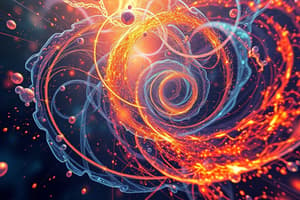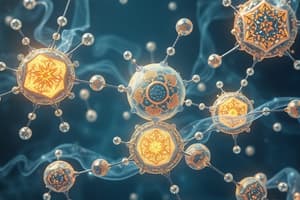Podcast
Questions and Answers
What does Postulate 1 state?
What does Postulate 1 state?
Gases consist of tiny particles (atoms or molecules).
According to Postulate 2, what can the volume of the individual particles be assumed to be?
According to Postulate 2, what can the volume of the individual particles be assumed to be?
- The sum of all particle volumes
- Zero (correct)
- Very small but measurable
- One liter
What is described in Postulate 3 regarding particle motion?
What is described in Postulate 3 regarding particle motion?
The particles are in constant random motion, colliding with the walls of the container.
According to Postulate 4, gas particles attract or repel each other.
According to Postulate 4, gas particles attract or repel each other.
What does Postulate 5 state about the kinetic energy of gas particles?
What does Postulate 5 state about the kinetic energy of gas particles?
Flashcards
Postulate 1
Postulate 1
Gases are composed of tiny particles (atoms or molecules).
Postulate 2
Postulate 2
The volume of individual gas particles is negligible compared to the total volume.
Postulate 3
Postulate 3
Gas particles are in constant, random motion, colliding with container walls.
Postulate 4
Postulate 4
Signup and view all the flashcards
Postulate 5
Postulate 5
Signup and view all the flashcards
Study Notes
Kinetic Molecular Theory Postulates
- Gases are composed of very small particles, which can be atoms or molecules.
- The size of gas particles is negligible compared to the distances between them, allowing the assumption that their volume is insignificant.
- Gas particles are continually in random motion, with frequent collisions against the walls of their container; these interactions generate the pressure exerted by the gas.
- There are no attractions or repulsions between the gas particles; they are considered to move independently of one another.
- The average kinetic energy of gas particles correlates directly with the gas's temperature measured in Kelvin, reflecting principles outlined in Charles' Law.
Studying That Suits You
Use AI to generate personalized quizzes and flashcards to suit your learning preferences.




